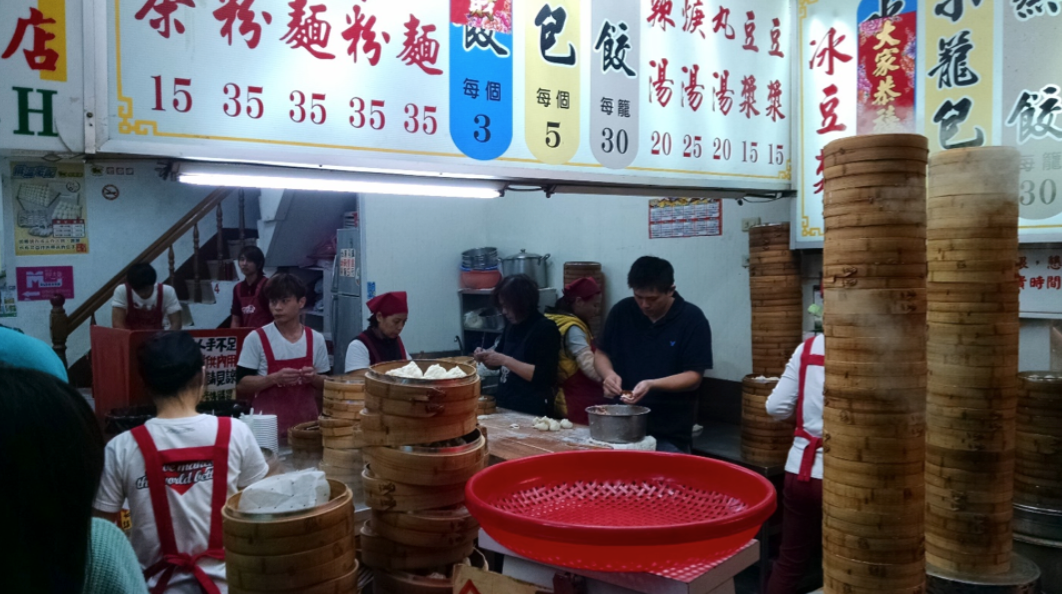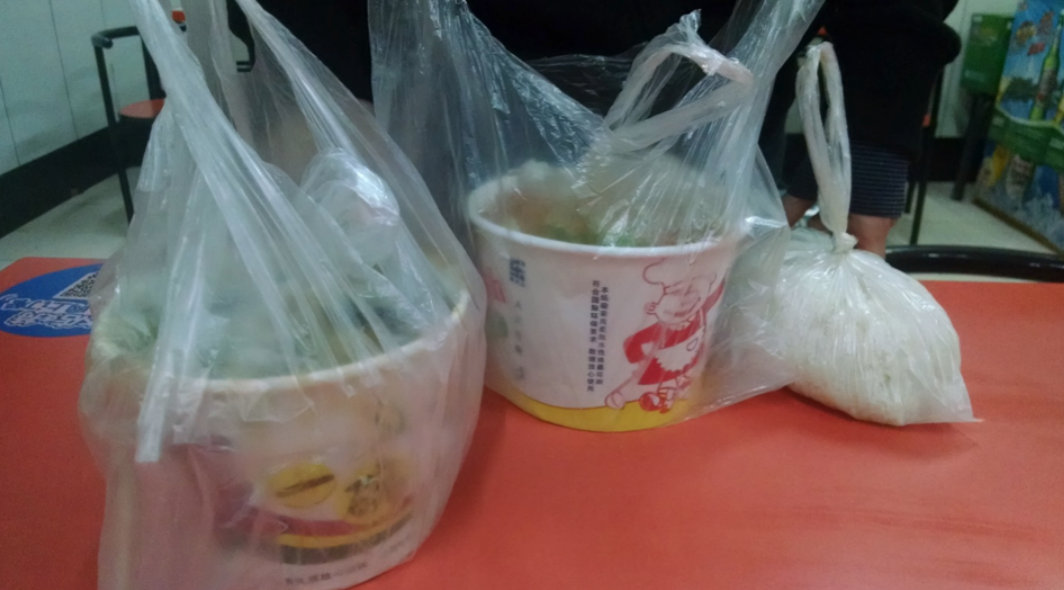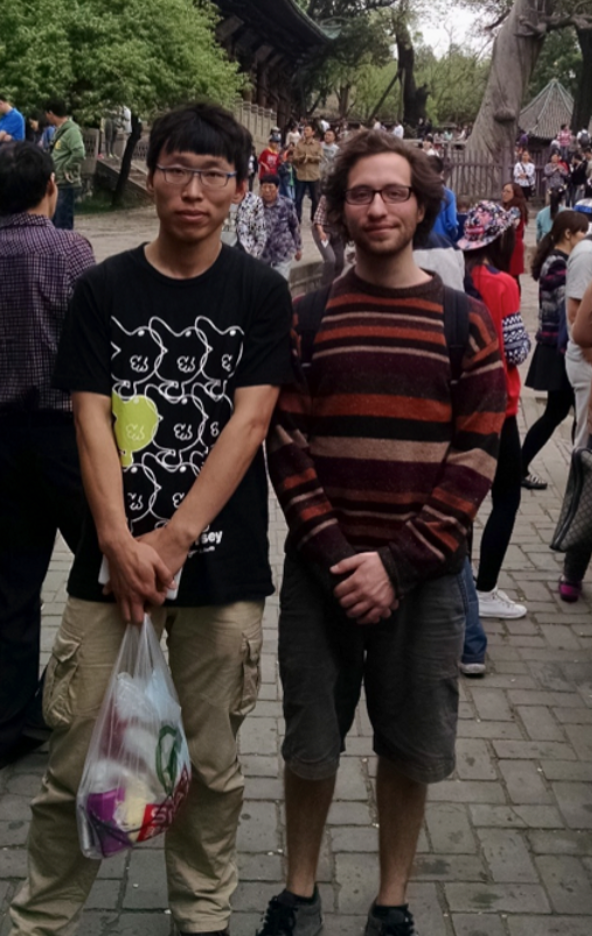Banana is the word: The Culinary Adventures of a Vegetarian in China
Nathan Michaelson '14, Shanxi Agricultural University (2014-2016)
My first official word of Chinese was 香蕉 (xiāngjiāo, banana). The second, was 派 (pài, a loanword for “pie”). I arrived in Beijing last June knowing no Mandarin beyond 你好 (nǐhǎo) and 谢谢 (xièxiè), having chosen to study French and Japanese in both high school and Oberlin. Exhausted from my 20 odd hours in transit lugging around 2 giant suitcases, I was pulled by the promise of free Wifi to the ubiquitous golden arches of McDonald’s (麦当劳màidāngláo), a little delirious and sleep-deprived, armed with only a Chinese dictionary app and my appetite. Before coming to China, I had decided to continue being vegetarian, despite multiple warnings from practically everyone I knew. “It’ll be impossible!” they said. “Nobody really knows what ‘being vegetarian’ means, and you’ll miss out on so much of the local cuisine! Plus, Chinese food in China is so much better than Chinese food in the US! Especially the meat!” However, my heart was set, and vegetarian I would stay. Limited both culinary and linguistically, I eventually, after some frantic app checking, chose the only vegetarian item that wasn’t French fries on the laminated, illustrated menu reserved for foreigner: the limited edition Brazilian World Cup-themed banana pie.
The notorious black sesame ice cream, with Beijing’s Wángfǔjǐng (王府井) neighborhood behind. I saw some Chinese tourists taking similar pictures so I copied them (March 2015).
In my defense, you can buy two ice creams or pies for about $1, and they periodically change the flavor from red bean, to Matcha green tea, to black sesame that tasted oddly like peanut butter. I swear, although my first snack in China was at McDonald’s, I now only eat Western food as a rare treat, aided by the fact that it’s so hard to come by here in Taigu (although a new cramped foreign grocery store just opened up downtown). I mean, everyone was right: the food is much better here than the American counterpart. Just as my culinary horizons have since expanded, so too has my knowledge of Chinese words and characters, although I sometimes still struggle with conversations that deviate from the expected script of where are you from, what are you doing here, how much do you make, how is China different from the US. One of my favorite feelings here is learning a totally unfamiliar character only to have it appear on nearly every corner; how could I have never noticed that character before?
With friends Xiè Líng (谢玲) and Jiāo Tōng (交通) picking apples in the Taigu countryside (October 2014).
My first word, 香蕉, has proved to be extremely useful, though; the word 派, not so much. Every few days, I go to the fruit stand to buy bananas and other fruit, from mangoes, pineapples, dragon fruit, or apples, although I can’t help but be reminded every time of the inescapably popular song 小苹果 (xiǎopíngguǒ, Little Apple), which first started blaring from every street corner and on every radio station when I first arrived in June and only recently got dethroned as the most popular song in mainland China.香蕉 has allowed me to start conversations with the fruit vendors, who now know my order and are happy to see me. When I’m having a good Chinese day, where I can understand (almost) everything said to me, and more importantly, am (almost completely) understood without any awkward pauses, we talk about my life in the US and theirs in Taigu; when I’m having a bad Chinese day, I can just mutter how many 香蕉 I want before I hurry back home. When I’m rushing to my 8am class, I usually only have time for a breakfast of a banana and yogurt made on campus by the food science students. When I have a little bit more time, I eat 包子 (bāozi, steamed buns) stuffed with 麻辣 (málà, numbing and spicy) tofu or carrots and cabbage, dipped in either Shanxi’s famous vinegar or mung bean congee. Although I have learned which包子 do and do not have meat, I am still careful to ask clearly and multiple times which do, just to be sure. You can never be too sure, especially when my definition of what constitutes meat is usually much stricter than a Chinese person’s. However, although my Chinese is lacking in certain areas of conversation, through trial and error I am confident asking about the meat contents of the food I’m about to eat.
Intimidating full-wall menu in a local restaurant. Not only do I know what most of the food is now, I can tell you what does/doesn’t have meat.
I wasn’t always this comfortable navigating the intimidating menus in restaurants. The first time I had accidental meat was at a fancy 饺子 (jiǎozi, dumpling) restaurant my first week in Beijing. After scanning the menu filled with still unfamiliar characters, I asked my waitress for recommendations. As I had been warned, I added that “我吃素” (wǒchīsù, “I only eat vegetarian”), and not “我不吃肉”(wǒbùchīròu, “I don’t eat meat”, which is often understood to mean that “I don’t eat pork; other types of dead animal are okay”). She leaned over and grabbed the menu, pointing out a type of 饺子called “三鲜素” (Three Vegetarian Delicacies). When the tray of饺子 arrived, the light beige dumplings beautifully arranged in a circle, I suspected nothing. My first bite, dripping with vinegar and hot chili paste, was delicious, the vegetables inside moist with broth, the dough perfectly soft. My second bite, just as delicious, surprised me with a crunch. “Must be garlic,” I told myself. Still perfecting my chopstick technique, I accidentally dropped the half piece of dumpling in my side bowl of vinegar. It was then that I noticed the half-eaten white shrimp inside. Uh-oh.
Sometimes the only vegetarian thing on the menu are these cute red-bean dumplings in Shanghai, (January 2015).
Just as I have had to adapt to a new culture and language, I also have had to learn which foods may or may not contain even the smallest amount of meat. Once at the food street behind campus, a vendor told me his noodles with clearly visible pork slices didn’t contain any meat. After further pushing, he told me “差不多” (chàbùduō), “Eh, more or less.” When I first arrived and was still getting accustomed to real Chinese food, I once accidentally served myself a ladle-full of thin purplish-pink circular slabs from the cafeteria. I thought they were some sort of root vegetable or tofu—there are more varieties of tofu here than in the US, at least one of which is modeled after chicken necks and is sometimes hard to distinguish; unfortunately, this time, I had chosen the pork.
Beijing cafeteria food (July 2014).
I’ve quickly learned that everything has meat in it, even when it doesn’t. The tofu dishes, my go-to orders back home, usually have meat, especially the spicy, diced麻婆 (mápó) tofu or the 干锅千叶 (gānguōqiānyè) tofu, thin rectangular slices served over a bed of onions and peppers in a metal dish over an open flame. As I learned the hard way, sometimes dumplings do, too. A few times, I have detected a hint of chicken fat after biting into a plate of seemingly innocuous vegetables; other times, a meat dish looks surprisingly like vegetables (Oh, veggies, why must you betray me so!). Eggs are usually safe, but who would want to eat tomato-egg for every meal when you have 5000 years of cuisine to taste? There are also the times when I’m feeling relaxed and forget to specify “No meat.” I’ll try to re-explain my dietary restrictions in broken Chinese, especially if I am having a good Chinese day or with a friend who understands my vegetarianism. Sometimes, though, the plate just comes back nearly identical.
BeiMen 北门 food street near campus
Non-vegetarian street food in Zhūjiājiǎo朱家角, near Shanghai (January 2015).
If I want to be an active member of the Taigu community, or more plainly, just eat, I need to have a more 差不多 (more or less) definition of vegetarianism, but not without trying. Once, at a hot pot restaurant, my friend Jason, whose Mandarin is highly accented with hints of Cantonese, graciously helped me to ask the waitress if there was any broth without chicken oil, a common ingredient in hot pot. When he assured me of the lack of any meat in the broth, he said “Dou you,” everything has it. “都有 (dōuyǒu)?” I asked back, nervously calling the waitress back to clear things up. “Dou you,” she repeated. “都有?” I asked again. Jason, the Abbott to my Costello, looked at me and laughed. “No, not 都有. 豆油 (dòuyóu, soybean oil). Let’s eat!”
Dumplings in Taiwan (February 2015)
Some people, like Jason, don’t care that I don’t eat meat, and then go out of their way to help me find things to eat. When I travel, I discover local vegetarian communities, be it a foodie hotspot in Shanghai, or a Buddhist restaurant attached to a temple in Guangzhou (where I may add, a monk, seeing that I was sitting alone, started up a conversation with me about Buddhism and gave me a little Buddha statue). However, the very idea of vegetarianism is as foreign to some people here as my naturally wavy hair—my first Chinese teacher, after asking if my hair was natural, told me that I could never get my hair cut in China because “they don’t know how to cut your hair.” They think of it as just another item to add to the list of why foreigners are different (read: weird), because of course, being the first foreigner that many people meet, my personality and habits are often extrapolated to all Westerners and Western cultures. After going swimming one day, I finished showering before my swimming buddy. As I was getting dressed in the adjacent changing room, I overheard him talking to another swimmer. “Not only do foreigners take short showers, but that one doesn’t even eat meat!”
Vegetarian and meat-filled dumplings cooked by Ruì Píng (瑞萍)
Theo helping to design a pizza in a local restaurant (Taigu’s first!) that unfortunately closed down (October 2014).
Taigu takeout
I came to China to become a better English teacher, to share my culture with my students and community, and in turn, discover the differences between Chinese and American culture. The more I teach, the more I see what I don’t know about English grammar, about why things do or do not sound natural. Passive voice? Modal verbs? Sentence and word stress? That versus which? From a linguistic point of view, it’s fascinating to explore English from a learner’s perspective, breaking the language down to see what makes it tick (sorry, I just did a class on idioms). I then have fun implementing various projects that allow my students to use their new knowledge, from designing a fake App (in Chinese, it’s read letter by letter: “Eyy Pee Pee”) to giving tours of campus, to taking photos of community members, “Humans of New York” style, and then turning the classroom into an art gallery where students freely discuss their photographs—in English, of course.
Teacher Nathan and a lesson on tongue twisters (April 2015)
Important lesson on food vocabulary (October 2014)
Likewise, as I discover more about China, its (5000 years of) history, its (diverse) culture(s), the (one dialect of the) language (I am currently focusing on), the more I realize I don’t know and didn’t even know I didn’t know. As I discover more and more of these cultural misunderstandings every day, I am better able to better understand not only the actions of those around me, but also how my own behavior and actions I naively thought inoffensive may have been perceived differently by those around me. I love glimpsing American culture and American English from another perspective, and am learning to change my behavior to pre-empt further misunderstandings.
With a friend at the JinCi (晋祠) temple near Taiyuan (April 2015).
Despite all the bumps along the way, I enjoy learning and laboring in China. I can speak a little more coherently and read more and more of the (informational and cultural) signs around me. As much as I avoid reminding myself, my time here is limited. I’m but a guest, and only have so much time to connect with this community. There are only 7 foreigners in Taigu, so the local shopkeepers give us adjectives to tell us apart: the tall one, the short one, the blonde one… If I become known as “the silly one who doesn’t eat meat,” I know that I’ve left my mark, at least in some small, silly way.
With Theo and fellow former-Obie, Jo-Han Wang, enjoying shaved ice at Taipei’s RaoHe Street Night Market (February 2015).
















